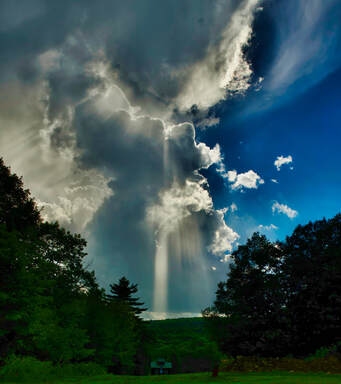
My wife is currently in Arizona visiting with her mom — she generally makes it the great southwest at least three, sometimes four, times a year. I know her mother greatly appreciates her faithfulness; although Linda calls her once or twice a week, unsurprisingly her mother thinks it is better to have the in person visits. I agree, at least, that is what I tell Linda when she is in the Valley of the Sun: "it’s good to talk with you on the phone but it’s nice so interact with you in person, especially over those gourmet dinners that you lovingly prepare for me (perhaps lovingly is not quite accurate; it might just be dutiful; though that's probably not right either, as it wasn’t included in the marriage covenant)." Anyway, I got you it yourself leftovers for that comment.
I was recently asked what I do with all my free time in retirement. Generally, my routine is simple and consists in mastering the art of being & non-being. Once again my wife helped me articulate what that actually means. A few weeks ago, she asked me what I was going to do that day and I told her — nothing! She said, that’s what you did yesterday, and I replied, that is correct, but I didn’t finish. That is the art of being and non-being at the same time. Of course, I suppose doing nothing is, in a manner of speaking, doing something; though that something is generally of little or no consequence. In my case, those non-being acts are observational testimony to the effects of age related entropy and may be observed in my daily routine of inconsequential activities generally involving playing two to three hours of pickleball, taking random photos of whatever catches my eye (here's a link to my Flickr photo site: www.flickr.com/photos/100353575@N06/), reading, periodically playing the piano (generally review the hymns for an order of worship for wherever I'm scheduled to preach [I suppose, that may be the one activity that is of some consequence]), finally, I meet with a friend or two to discuss theology, philosophy and esoteric subjects of monumental insignificance that the vast majority of people spend their lives trying to avoid.
If it wasn’t such a bother, I’d write a book on writing stream of conscience email letters, and assorted other trivial things — the problem with words like “things” is that the word is nebulous and, frankly, takes too much work to fill in the blank that it leaves on the page, both as a reader and as a writer -- Thankfully, I’ve read A Confederacy of Dunces by John Kennedy Toole and I’m now properly cautioned against any such literary undertaking; it can only lead to paranoia, depression and suicide.
I was recently asked what I do with all my free time in retirement. Generally, my routine is simple and consists in mastering the art of being & non-being. Once again my wife helped me articulate what that actually means. A few weeks ago, she asked me what I was going to do that day and I told her — nothing! She said, that’s what you did yesterday, and I replied, that is correct, but I didn’t finish. That is the art of being and non-being at the same time. Of course, I suppose doing nothing is, in a manner of speaking, doing something; though that something is generally of little or no consequence. In my case, those non-being acts are observational testimony to the effects of age related entropy and may be observed in my daily routine of inconsequential activities generally involving playing two to three hours of pickleball, taking random photos of whatever catches my eye (here's a link to my Flickr photo site: www.flickr.com/photos/100353575@N06/), reading, periodically playing the piano (generally review the hymns for an order of worship for wherever I'm scheduled to preach [I suppose, that may be the one activity that is of some consequence]), finally, I meet with a friend or two to discuss theology, philosophy and esoteric subjects of monumental insignificance that the vast majority of people spend their lives trying to avoid.
If it wasn’t such a bother, I’d write a book on writing stream of conscience email letters, and assorted other trivial things — the problem with words like “things” is that the word is nebulous and, frankly, takes too much work to fill in the blank that it leaves on the page, both as a reader and as a writer -- Thankfully, I’ve read A Confederacy of Dunces by John Kennedy Toole and I’m now properly cautioned against any such literary undertaking; it can only lead to paranoia, depression and suicide.
 RSS Feed
RSS Feed